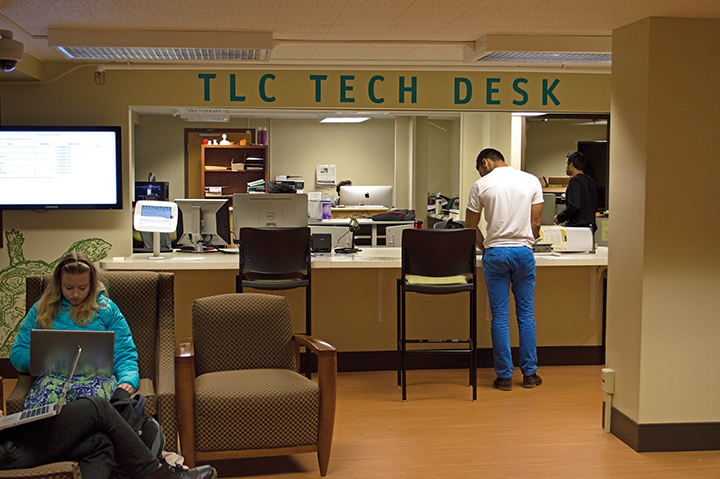
The TLC Tech Desk, where students can check out equipment and reserve rooms in McKeldin Library.
Throughout the past several years, students have seen McKeldin Library undergo a transformation. Shared study space gradually spread across the building’s second floor, digital resources grew and library staff is in the process of moving less-frequently-used books and journals out of the library to create space for students to use new technology.
These changes are part of a larger vision, said Gary White, libraries public service associate dean. Because many of the library’s traditional resources, such as books and journals, have become digital, the building no longer needs to provide an exclusively “monastery-like, contemplative environment” housing old books and silent students.
Instead, White said, the administration is looking to North Carolina State University and its brand-new, more than $100 million Hunt Library as a model for changes to this university’s libraries over the coming years.
“[McKeldin] Library is almost a completely different animal that it was in my freshman year,” said Kevin LaCherra, a senior government and politics and history major, who joined the library’s student advisory group during his sophomore year. Since then, he’s had a hand in transforming McKeldin into a more modern resource for students.
“McKeldin was not a place I wanted to go to study,” LaCherra said. But with the addition of communal study space and added resources, the group hopes to “give the students a home during the day.”
The Terrapin Learning Commons on McKeldin’s second floor was the first major step toward that vision. It includes communal study space where White said students will hopefully find it easier to work on group projects or study together. With the common space and technological resources, the goal is to create “maker spaces,” where students can collaborate and experiment with the help of new technology, such as the 3-D printer installed this semester.
Marisa Flores, a senior government and politics and history major, uses the common space to study between classes.
“I like that I can see it’s busy, but it’s quiet enough that I can put on my headphones and tune everything out. … I like to see a little bit of movement,” she said. “[But] I do wish there was another floor with open areas like this.”
Flores, like many students, uses the library’s printers and copiers. But for research, she said she is more likely to use the school’s digital databases than to pull books off the shelves.
To keep up with that trend, White said, this university plans to make more technological resources available to students and continue moving some less-frequently-used print materials off-site to create more space for students.
“We’re transitioning from a print resources-centered library to a learning resources-centered library,” White said. “The library has a solitary reputation, and we want to retain that while encouraging collaborative and interdisciplinary stuff between all kinds of students.”
Funding for these changes, White said, will come from both the university budget and outside sources, such as grants and private donations. The library administration just launched a major push to bring in more private donations, which historically represent a small portion of the library budget and are usually gifted for specific collections, such as Jewish history materials or poultry science.
The next major step, he said, will be major remodeling of McKeldin’s first floor scheduled for the next one to three years. The plan is for it to resemble the Terrapin Learning Commons, but because funding will likely continue to be an obstacle, progress may be incremental.
Emett Brynt, a senior criminology and criminal justice major, said he prefers to study on the quieter upper floors where there are fewer distractions. As long as there is still that option, he said, the changes sound beneficial.
“I don’t really see people using any of the books. I never really use them,” he said. “A lot of this space is unused, and I think they could turn it into something else.”



